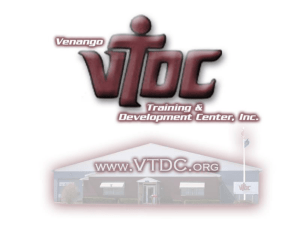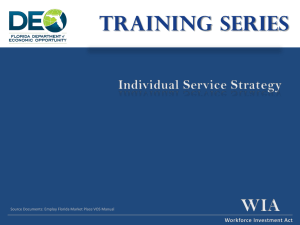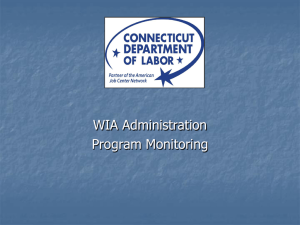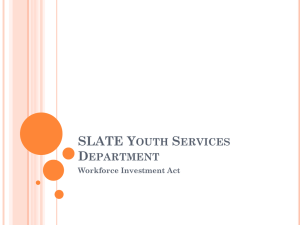Region 4 Workforce Investment Board Youth Program Elements
advertisement
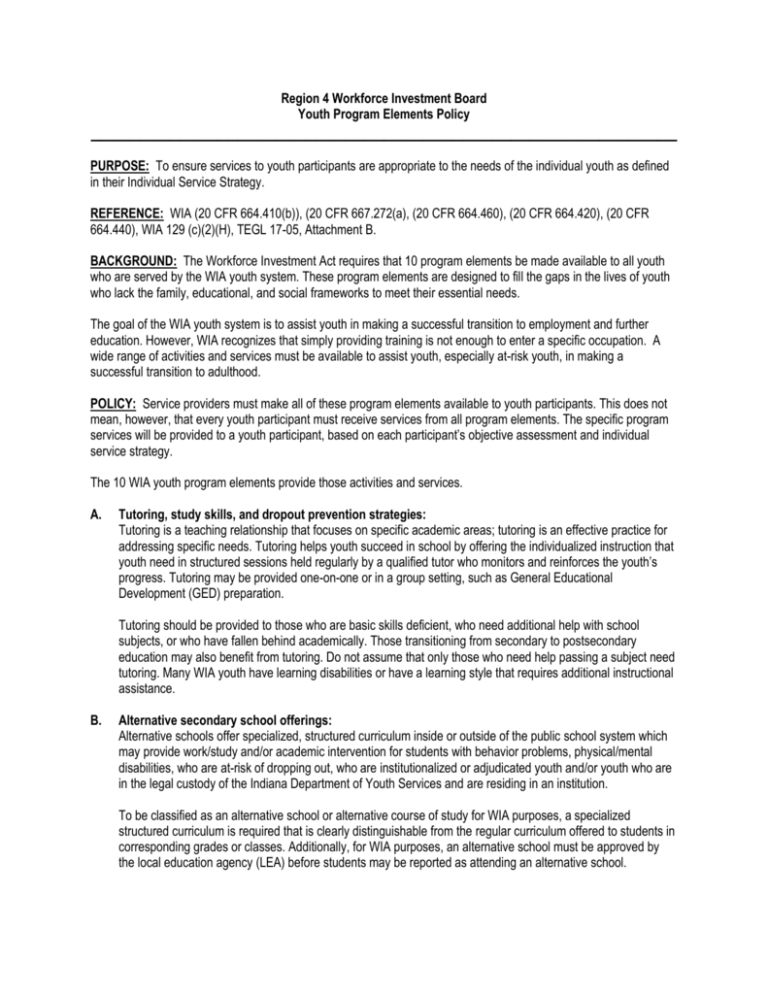
Region 4 Workforce Investment Board Youth Program Elements Policy ____________________________________________________________ PURPOSE: To ensure services to youth participants are appropriate to the needs of the individual youth as defined in their Individual Service Strategy. REFERENCE: WIA (20 CFR 664.410(b)), (20 CFR 667.272(a), (20 CFR 664.460), (20 CFR 664.420), (20 CFR 664.440), WIA 129 (c)(2)(H), TEGL 17-05, Attachment B. BACKGROUND: The Workforce Investment Act requires that 10 program elements be made available to all youth who are served by the WIA youth system. These program elements are designed to fill the gaps in the lives of youth who lack the family, educational, and social frameworks to meet their essential needs. The goal of the WIA youth system is to assist youth in making a successful transition to employment and further education. However, WIA recognizes that simply providing training is not enough to enter a specific occupation. A wide range of activities and services must be available to assist youth, especially at-risk youth, in making a successful transition to adulthood. POLICY: Service providers must make all of these program elements available to youth participants. This does not mean, however, that every youth participant must receive services from all program elements. The specific program services will be provided to a youth participant, based on each participant’s objective assessment and individual service strategy. The 10 WIA youth program elements provide those activities and services. A. Tutoring, study skills, and dropout prevention strategies: Tutoring is a teaching relationship that focuses on specific academic areas; tutoring is an effective practice for addressing specific needs. Tutoring helps youth succeed in school by offering the individualized instruction that youth need in structured sessions held regularly by a qualified tutor who monitors and reinforces the youth’s progress. Tutoring may be provided one-on-one or in a group setting, such as General Educational Development (GED) preparation. Tutoring should be provided to those who are basic skills deficient, who need additional help with school subjects, or who have fallen behind academically. Those transitioning from secondary to postsecondary education may also benefit from tutoring. Do not assume that only those who need help passing a subject need tutoring. Many WIA youth have learning disabilities or have a learning style that requires additional instructional assistance. B. Alternative secondary school offerings: Alternative schools offer specialized, structured curriculum inside or outside of the public school system which may provide work/study and/or academic intervention for students with behavior problems, physical/mental disabilities, who are at-risk of dropping out, who are institutionalized or adjudicated youth and/or youth who are in the legal custody of the Indiana Department of Youth Services and are residing in an institution. To be classified as an alternative school or alternative course of study for WIA purposes, a specialized structured curriculum is required that is clearly distinguishable from the regular curriculum offered to students in corresponding grades or classes. Additionally, for WIA purposes, an alternative school must be approved by the local education agency (LEA) before students may be reported as attending an alternative school. The purpose of alternative secondary school services is to provide education and instruction that meet the needs of youth who have not been successful in traditional education programs. Alternative secondary school services should be provided to students with behavior problems, physical/mental disabilities, who are at risk of dropping out, who are institutionalized or adjudicated youth and/or youth who are in the legal custody and are residing in an institution. C. Summer employment opportunities linked to academic and occupational learning: Summer employment opportunities (SEO) linked to academic and occupational learning is a single program element that must be made available to WIA youth participants. The purpose of SEO is to give youth experience in the career field in which they are interested and to assist them in developing academic and occupational skills that will transfer to employment in that field. Offering this element in the summer allows youth the opportunity for an in-depth career experience. Youth must be paid a wage, not stipends or incentives, for the employment component of SEO. Unpaid work experience – however valuable – is not summer employment. Work experience for which youth receive a stipend or work experience that is not connected to their career goals does not qualify as SEO. Youth may be paid a stipend or a wage for the learning component of SEO. Employment under SEO is subsidized. If the employment is unsubsidized, it is a positive youth outcome, but does not meet the criteria for participation in a program element. Qualifying SEO Activities: Employment for which youth are paid a wage Employment that is linked to the career or employment goal as stated in the youth’s ISS Academic and occupational skill training provided in conjunction with employment MINIMUM WAGE REQUIREMENTS AND EXCEPTIONS FOR WIA YOUTH PROGRAM PARTICIPANTS WIA regulations (20 CFR 667.272(a)) require that participants be compensated at the same rate as trainees or employees who are similarly situated in similar occupations by the same employer and who have similar training, experience, and skills. Indiana’s minimum wage law will not exempt employers from this rule. There may be instances when WIA youth participants may receive wages less than the new Indiana minimum wage rate, provided that these lower wages do not violate the similarity provision in 667.272(a). There should be a Worksite Agreement between each worksite and the service provider for all summer employment opportunities. D. Paid and unpaid work experience: Work experiences are short-term, planned, structured learning experiences that occur in a workplace and are focused on career exploration and the development of work readiness skills (20 CFR 664.460). The primary purpose of work experience is to expose youth to the requirements of work and to employers’ expectations. Additional benefits, such as increased motivation to continue in school or improved academic skills, may result from participation in work experience, but they are not the primary purpose. Work experiences may include: Instruction in employability skills or generic workplace skills such as those identified by the Secretary's Commission on Achieving Necessary Skills (SCANS) Exposure to various aspects of an industry Progressively more complex tasks Internships and job shadowing The integration of basic academic skills into work activities Supported work, work adjustment, and other transition activities Entrepreneurship Service learning (only if an O*NET code can be assigned) Community service Exposure to various aspects of an industry Progressively more complex tasks Work experience must be based on identified needs of the individual youth but does not have to be tied to the youth’s individual career or employment goal. Use of work experience situations should be based on an objective assessment and service strategy identified in the youth’s ISS; youth exploring careers may have briefer experiences than youth who need to learn good work habits. Qualifying Work Experience Activities: Paid or unpaid work in the private, for-profit, non-profit, or public sectors with a planned start and end date Developing work readiness or employability skills, such as dressing appropriately or answering phones, in a real workplace setting Developing personal attributes, knowledge and skills, such as working on a team, in a workplace setting Career exploration in a workplace setting Developing academic or occupational skills as they relate to a workplace On-the-job training for older youth when based on needs identified in objective assessment Subsidized employment Public service employment is permitted for WIA youth participants. MINIMUM WAGE REQUIREMENTS AND EXCEPTIONS FOR WIA YOUTH PROGRAM PARTICIPANTS WIA regulations (20 CFR 667.272(a)) require that participants be compensated at the same rate as trainees or employees who are similarly situated in similar occupations by the same employer and who have similar training, experience, and skills. Indiana's minimum wage law will not exempt employers from this rule. There may be instances when WIA youth participants may receive wages less than the new Indiana minimum wage rate, provided that these lower wages do not violate the similarity provision in 667.272(a). There should be a Worksite Agreement between each worksite and the service provider for all work experience opportunities. E. Occupational skill training: Occupational skill training constitutes an organized program of study that provides specific vocational skills that lead to proficiency in performing actual tasks and technical functions required by certain occupational fields at entry, intermediate, or advanced levels. Such training should: Be outcome-oriented and focused on a long-term goal as specified in the youth’s ISS, and Result in attainment of a certificate. F. Leadership development: Leadership development is a broad set of activities that encourage responsibility, employability, and other positive social behaviors. The purpose of leadership development activities is to develop skills and attitudes that are important in all areas of life – education, employment, family, and community. Many youth do not have those skills and attitudes; others don’t believe they have them. Leadership development provides encouragement and support to youth, developing skills and instilling confidence as they transition into adulthood. Types of leadership development opportunities include: Exposure to postsecondary educational opportunities Community and service learning projects Peer-centered activities, including peer mentoring and tutoring Organizational and team work training, including team leadership training Training in decision-making, including determining priorities Citizenship training, including life-skills training such as parenting, work-behavior training, and budgeting of resources (20 CFR 664.420) Qualifying Leadership Development Activities: Community volunteering Service learning Peer mentoring or tutoring Character education Citizenship education, including how and why to vote Serving on youth council, community or advocacy organization boards, etc. Leadership training, such as how to work in a team, how to run meetings, diversity training Life-skills training, such as parent education, financial education, goal setting, conflict resolution G. Supportive services: Supportive services include assistance such as transportation, child care, dependent care, and housing that is necessary to enable an individual to participate in WIA youth program activities (WIA §101(46). All youth who have needs that either could prevent them from participating or limit their participation in WIA youth programs should receive supportive services. The extent of supportive services provided to individual youth will vary based on personal need. Supportive services for youth may include but are not limited to (20 CFR 664.440): Assistance with transportation Assistance with child care and dependent care Assistance with housing Referrals to medical services Assistance with uniforms or other appropriate work attire and work-related tool costs, including such items as eye glasses and protective eye gear Adult mentoring for at least 12 months: Adult mentoring is a one-to-one supportive relationship between an adult and a youth that is based on trust. High-quality adult mentoring programs include an adult role model who builds a working relationship with a youth and who fosters the development of positive life skills in youth. Youth should receive adult mentoring for the period of participation and a subsequent period, for a total of not less than 12 months (WIA §129(c)(2)(H)). Qualifying Adult Mentoring Activities: Participation in mentoring programs such as Big Brothers Big Sisters Virtual adult mentoring via e-mail, teleconferencing, or other electronic communication Long-term, structured programs that provide training and support to mentors as well as to youth Adult mentoring programs that foster career awareness or positive social behaviors Supplementing adult mentoring activities with additional materials and resources H. Comprehensive guidance and counseling: The purpose of comprehensive guidance and counseling is to promote growth in each youth’s educational, personal and social, and employability skills. Comprehensive guidance and counseling is a process of helping youth make and implement informed educational, occupational, and life choices. Comprehensive guidance and counseling programs impart skills through counselor-directed learning opportunities that help youth achieve success through academic, career, personal, and social development. An effective comprehensive guidance and counseling program develops a youth’s competencies in self-knowledge, educational and occupational exploration, and career planning. Many at-risk youth need such assistance in making informed decisions and choices. In addition, some at-risk youth need assistance in changing serious problem behaviors – for example, alcohol and drug use; anti-social behaviors like violence, bullying, or self-mutilation; or involvement with the juvenile justice system. Comprehensive guidance and counseling is appropriate for youth with such problems, and it may include drug and alcohol counseling, as appropriate; it should always be designed to meet the needs of individual youth (WIA §129(c)(2)(J); 20 CFR 664.410(a)(10). Qualifying Comprehensive Guidance and Counseling Activities Drug and alcohol counseling Mental health counseling/therapy Career counseling Educational counseling Supplementing guidance and counseling activities with additional materials and resources. I. Follow-up activities for no less than 12 months after completion of participation Follow-up services are activities after completion of participation to monitor youths’ success during their transition to employment and further education and to provide assistance as needed for a successful transition. Follow-up services can include (20 CFR 664.450(a)) Follow-up services must be provided for not less than 12 months after the completion of participation (WIA §129(c)(2)(I); 20 CFR 664.450(a)). Effective Follow-Up Services: Regular contact with appropriate frequency with The youth The youth’s employer The youth’s postsecondary academic advisor Leadership development activities provided after completion of participation Supportive services provided after completion of participation Case management activities Effective: July 2008 Revised: Effective Date July 1, 2011 to reflect WIB status
